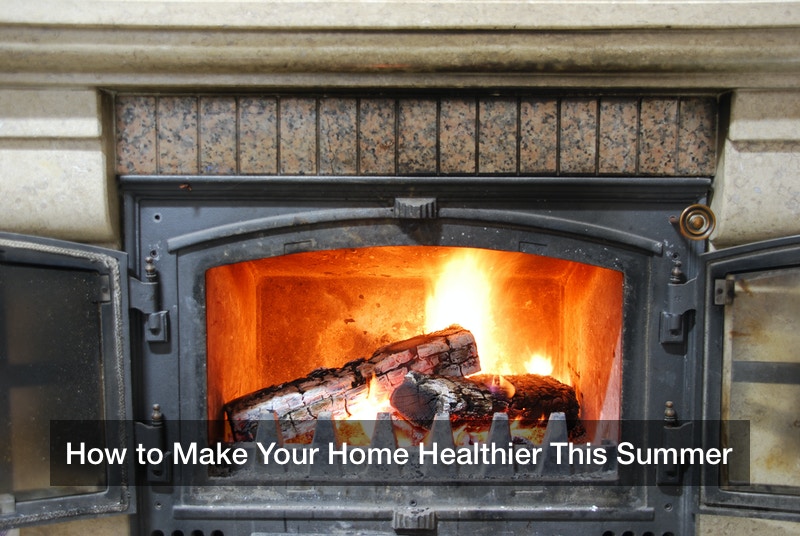

If one of your goals this summer is to help your family become healthier, you have to start with making your home healthier. Your home is your family’s sanctuary, especially in the time of the COVID-19 pandemic when you’re staying inside more than ever before. As you spend time relaxing in your home and on your property, you’ll want those spaces to be optimized for your health and wellbeing.
In order to make your home as healthy as possible, you need to know the common health issues that arise inside houses and how you can fix them before they start. Let’s take a look at how you can make your home healthier this summer.
Use Low-VOC Paint
While the removal of lead in modern paints has made them much healthier than they were in the past, you should still be careful with which paints you choose when painting your home. About 9% of the volatile organic compound (VOC) emissions from consumer and commercial products comes from paints, stains, and other architectural coatings, according to the U.S. Environmental Protection Agency (EPA). This makes them the second-largest source of VOC emissions after automobiles.
If you’re giving your home a fresh coat of paint or sealing your wooden deck this summer, make your home healthier by choosing products that emit low or no VOCs. Look for products that say they are low-toxic, low-odor, water-based adhesives and caulks. These choices emit fewer fumes and quickly stop releasing chemicals.
Change Your AC Filter

Your home’s air conditioning system works hard to keep your family cool and comfortable all summer long. If your air conditioner is a part of your home’s larger HVAC system, then it works in conjunction with that system to make your home the perfect temperature all year round. As it does this hard work cycling through the air in your home, the system also filters out some of the most common air pollutants. Over time, these filters fill up and don’t do their job as well as they used to, negatively impacting your indoor air quality.
To make your home healthier and ensure that your home has good indoor air quality, be sure to change your AC filters regularly. You can do this on your own or you can get an air conditioning service plan that includes a filter change. These plans also typically include other types of HVAC service and maintenance, allowing you to rest easy knowing that your home’s HVAC system is in the hands of experienced professionals. While anyone can benefit from these service plans, those who are allergy-prone or live in a metropolitan area with high levels of pollution can experience great perks by trusting professionals with their home’s HVAC needs.
Check the Air Ducts
While the filters help ensure that you have clean air circulating throughout your home, the air ducts are responsible for getting hot and cold air throughout your home. Without your home’s air ducts, the rooms in your home wouldn’t be equally comfortable, with fluctuating temperatures in each room. As these ducts are key in distributing air throughout your home, keeping them clean helps maintain the good indoor air quality in your home.
Dust, dander, mold, and other contaminants can accumulate in your air ducts over time, reducing your home’s overall air quality. Eventually, these contaminants can affect your family’s health and wellbeing. The best way to make your home healthier and ensure that your ducts are clean is to contact an HVAC company for professional maintenance. They’ll have the resources and knowledge to rid your air ducts of contaminants, leaving them clean and able to circulate fresh air in your home.
Install Carbon Monoxide Detectors
Another important aspect of maintaining good indoor air quality is having working carbon monoxide detectors. These detectors notify you of any carbon monoxide in your home, which is a deadly odorless gas. The Consumer Product Safety Commission recommends installing carbon monoxide detectors near sleeping areas for optimal protection against the dangerous gas.
If you already have detectors in your home, test them to make sure that they still work. If the test shows that they don’t work or you don’t have any detectors in your home, be sure to install new ones as soon as possible. Carbon monoxide detectors are essential in protecting your family’s health against a dangerous, otherwise undetectable gas.
Test Smoke Detectors

While you’re evaluating your home’s protection against carbon monoxide, take the time to also test your home’s smoke detectors. Although a fire is much easier to detect on your own than carbon monoxide, having working smoke detectors in your home will give you the notice you need to safely get out of your home before the fire grows.
Go around your home and test your smoke detectors, which should be placed on each level of your house, if not more frequently throughout it. If the detector doesn’t respond, try replacing the batteries. If new batteries don’t fix the problem, install new smoke detectors to ensure that you have the fire protection you need in your home. To optimize that protection, consider installing sprinklers and keeping a fire extinguisher in your home in case of emergencies.
Address Leaks to Prevent Water Damage
As a problem that damages the structural integrity of your home as well as your health, every homeowner should consider water leaks a serious issue. They may start small and not seem to affect your quality of life, but ignoring leaks can quickly lead to serious situations that require extensive water damage repair. Water damage can compromise important elements of your home’s structure and it can cause mold, mildew, and dry rot. These can be dangerous for your family’s health, causing a variety of different illnesses.
To make your home healthier, be sure that you keep up with maintenance on your home’s plumbing system so that you can take care of leaks before they cause major damage. If you notice that you have a leak at any time of the day, you can contact 24 hour emergency plumbing services to address the issue right away. By getting immediate help, you won’t run the risk of the water causing more severe damage that is difficult to fix.
Invest in Water Detection Devices
Sometimes, you may not spot leaks before they’ve caused a lot of damage. If your home’s plumbing system is prone to leaks or you live in an area where basement flooding and seepage is a major concern, consider installing water detection devices. These small electronic devices sound an alarm when their sensors come in contact with moisture. By alerting you as soon as it detects unusual moisture levels or slow leaks, this device allows you to contact services for emergency water damage restoration and address any issues as soon as they occur. This quick response will help you avoid having to pay for more extensive restoration.
You can install water detection devices anywhere in your home. Homeowners will often put them near water heaters, sump pumps, dishwashers, washing machines, and toilets to prevent mold growth and extensive damage in those areas. If your area tends to experience flooding, placing a water detector in your basement would allow you to know when water seeps into your basement and you need to call for water removal service. As other homes in your neighborhood will likely need this service as well, being the first to know that you need it will put you first in line for the service.
Clean Thoughtfully

It may seem like any type of cleaning will make your home healthier and help protect your family from dangerous contagions. However, you can make your cleaning practices even healthier by following a few guidelines. The first way to make your home healthier through your cleaning practices is to sanitize your sponges by putting them in the microwave or dishwasher. Your sponge picks up a lot of germs and bacteria as you use it to clean various objects and surfaces and many people hold on to their kitchen sponges for too long. By sanitizing your sponge or replacing it regularly, you can make sure that you’re not spreading more germs around your home when you’re cleaning it.
In a similar vein, you should be replacing any brushes and sponges you use to clean yourself regularly to avoid bacteria build-up. For instance, you should change your toothbrush every three to four months. Not only does it ensure your toothbrush stays clean, but it prevents you from using a toothbrush with worn-out bristles. Without stiff bristles, your toothbrush won’t get rid of food and plaque on your teeth, which can lead to poor dental health and a trip to the dentist. If you use a loofah, you should change it every three to four weeks. A mesh bath pouf will last a little longer at about eight weeks, but you should still be careful of holding onto these for too long.
When shopping for cleaning products, look for ones that are made from plant sources rather than petroleum. They should also be free of chemicals that can irritate or pollute, such as chlorine and phosphates. By choosing natural cleaning products, you won’t be putting toxins in your home that can negatively impact the indoor air quality and your family’s health.
Eliminate Tripping Hazards Outdoors
If your family is going to be staying home for a lot of the summer, it means that they’re probably going to be spending a lot of time playing outside, especially the kids. To keep them safe as they play, make sure that there are no tripping or falling hazards on your property. While most of the falls your little ones have just result in scrapes and bruises, any fall could cause them to sprain an ankle or fracture a bone. You’ll then need to go to an urgent care center for sprain treatment or minor fracture treatment. The doctors at the clinic will likely be able to get your child back into good health quickly, but sitting in a waiting room isn’t the most enjoyable way to spend a summer day. Your child will also then have to take time to heal, missing out on summer fun for weeks to come. Avoid these outcomes by evaluating your home’s outdoor areas for safety just as you would evaluate a public playground or park that your child is playing in.
Common problem areas that may present tripping hazards are in the hardscape elements of your property. These are the elements that aren’t living, such as patios, driveways, and decks. Make sure that your patio and driveway are smooth and crack-free to prevent people from falling down on the hard surfaces. If your driveway does have cracks, contact asphalt contractors to repair them at the start of the summer. Check that your deck has secure gates and locks so that your kids don’t fall down deck stairs when you’re not outside to watch them. Your softscaping, which consists of the property’s living elements such as the grass and trees, may also present tripping hazards. Check your yard frequently for things like gopher holes so that unsuspecting feet don’t fall in them.
Use Natural Products in Your Landscaping

Many people will be spending their stay-at-home summers perfecting their home’s landscaping. As you work on these outdoor areas, consider how you can use more natural products to make your home healthier. To start, you can plant native vegetation in your landscaping. When you have native flora, you reduce the need for pesticides and fertilizers, which can be dangerous for your health.
If you do need to use pesticides and fertilizers for your landscaping, be sure to remove your shoes before entering your house. You can easily track pesticides and fertilizers in your home on the bottoms of your shoes, exposing your entire household to the chemicals in those products. You can take this precaution a step further by showering immediately after you apply pesticides and washing the clothes you were wearing separately for your other laundry.
Practice Dock Safety
If your home sits on a lake and you get to enjoy it via a dock that is attached to your property, you should regularly check on it to ensure that your children can safely enjoy that part of your home. You may have had a custom dock built so that you know exactly how safe it is for your family, but you should still perform regular maintenance on it. Be sure that storms throughout the year haven’t damaged the dock’s structure and that it is safe to walk on before your family starts using it during the summer.
If you do spot signs of damage on your dock, be sure to contact a dock building service to see if they can make repairs as soon as possible. To keep your children safe while using the dock, tell them to follow the buddy system so that no one ever goes near the water alone. Young kids, especially, should never be near the water without an adult to supervise them. While docks can provide a plethora of summer fun and entertainment, they can pose safety risks that you need to be aware of.
By following these tips, you can make your home healthier and your family safer this summer. Even the smallest steps can go a long way to make your home healthier, so don’t hesitate to take any type of action in the name of health, whether it is big or small.


